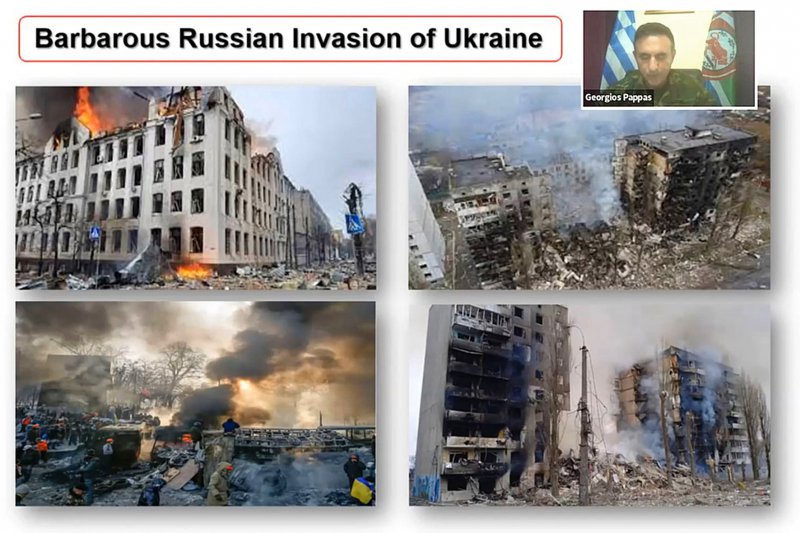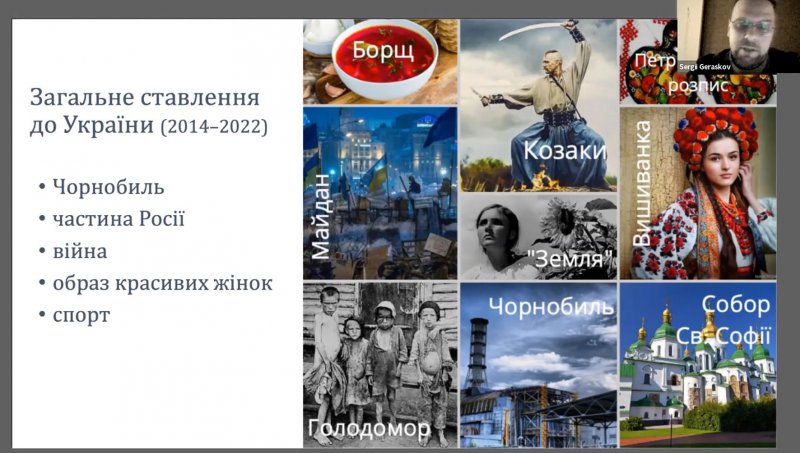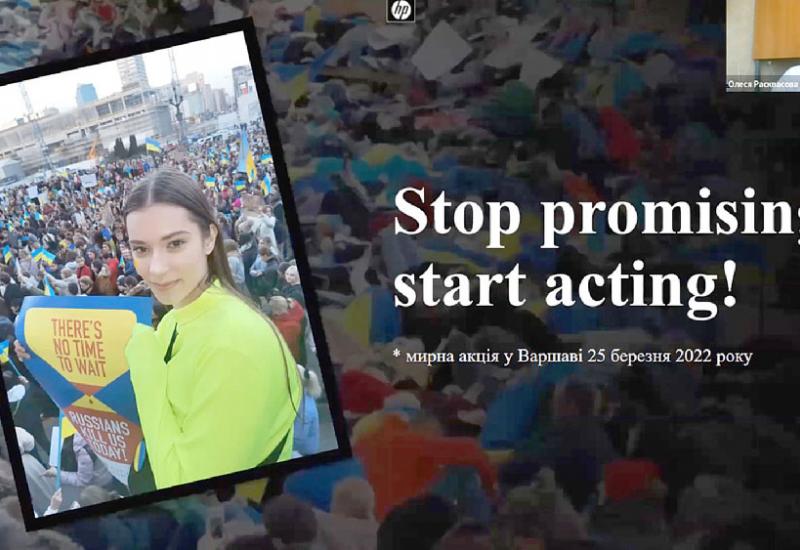Philosophical understanding of the problems of the current war and issues of support for Ukrainians inside the state and beyond its borders was the focus of the regular round table meeting "National and international tools for repelling armed aggression against Ukraine", which took place on the basis of the Faculty of Sociology and Law on May 6. Teachers and students of the Department of Philosophy, as well as foreign partners of the department, took part in it.
The initiative of the Faculty of Sociology and Law supported by the Department is respectable, since the participants of the round table meeting live in different corners of the planet and in different time zones now, and the part of the speakers that is in Ukraine is forced to take cover in shelters from time to time due to air alerts. But despite this, fruitful communication lasted more than three hours.
Moreover, there were almost no technical failures, for which special gratitude was expressed to associate professor Serhiy Geraskov, who provided technical support for the meeting. Opening the meeting, the head of the Department, Roman Bogachev, emphasized the urgency of the conversation and wished all participants peace and co-creation. Professor at the Department Maryna Prepotenska effectively moderated the conversation taking into account her scientific and journalistic experience. It is worth noting that among more than a half of a hundred participants in zoom, there were also students and graduate students of Igor Sikorsky Kyiv Polytechnic Institute.

Since the Department of Philosophy, in addition to direct philosophical disciplines, also has a graduating specialty "International social projects and volunteer activity", the participants paid a lot of attention to the programs of support for Ukrainians, which are currently being implemented in Ukraine and abroad. They are very important if we remember that more than 5 million of our fellow citizens received the status of temporarily displaced persons. So, the speakers unfolded a wide range of European programs and actions of solidarity with Ukraine. They also drew interesting historical and philosophical parallels with current events. A long standing partner of the Department, Hellenic Army General and, at the same time, doctor of philosophy Yorgas Papas (Athens) shared his thoughts on the problems of architectural security during the war, accompanying them with a vivid presentation.
Oksana Tereshchenko, a graduate student of the department provided participants with the accurate translation of his speech. By the way, she also talked about Greek aid programs for Ukraine. Yana Barinova (Kyiv-Vienna), Doctor of Philosophy, ex-director of the Department of Culture of Kyiv City State Administration, outlined the prospects for the country's cultural revival, spoke about the protection of Ukraine's cultural heritage during military operations and socio-cultural anti-war actions in Europe. Scientist and civil activist Lina Barinova (Vienna) showed photos and videos of humanitarian actions and performances in Austria and, in particular, of her speechification at the 40,000-seat stadium in Vienna, calling on Austrians to support our state. A young, but already well-known in Europe, scientist and political analyst Nicolas Imber (Paris) provided detailed and well-illustrated information and analysis on France's humanitarian programs for Ukrainians. Our long standing friend and colleague from Bulgaria, professor at St. Cyril and St. Methodius University of Veliko Tarnovo, member of the Bulgarian Academy of Sciences and Arts, writer and poet Vanya Angelova (Veliko Tarnovo) shared information about the actions of the Bulgarian government regarding humanitarian aid for Ukraine, and read her poems about current events.

Serhiy Geraskov's report aroused great interest among the participants. It was dedicated to how the Japanese perceive the tragic events in Ukraine and how our country’s image is fundamentally changing in their imagination, a deep respect for the Ukrainian people and its history is engendering. A very thoughtful analysis of discursive practices under martial law was presented by Tetiana Shchyrytsia, associate professor of the Department. Senior teacher Nataliya Denysenko also took an active part in the discussion. A group of students of Faculty of Sociology and Law prepared and commented on a presentation on volunteer programs to support the war effort as well as residents of Ukraine; they also highlighted aspects of infowar as a part of russia's aggression against Ukraine.
In conclusion, be it noted that this and similar events, as well as the resuming education at Ukrainian schools and universities in general, is another spiritual feat of the Ukrainians. After all, resistance to armed aggression can be not only armed: the revival of all forms of civilized life is also an effective resistance to the enemy's attempts to destroy Ukraine and its identity. So, this discussion proved once again: Ukraine has gained subjectivity on the world stage forever and will definitely come off with flying colors from this battle with rashism! Glory to the heroes!

